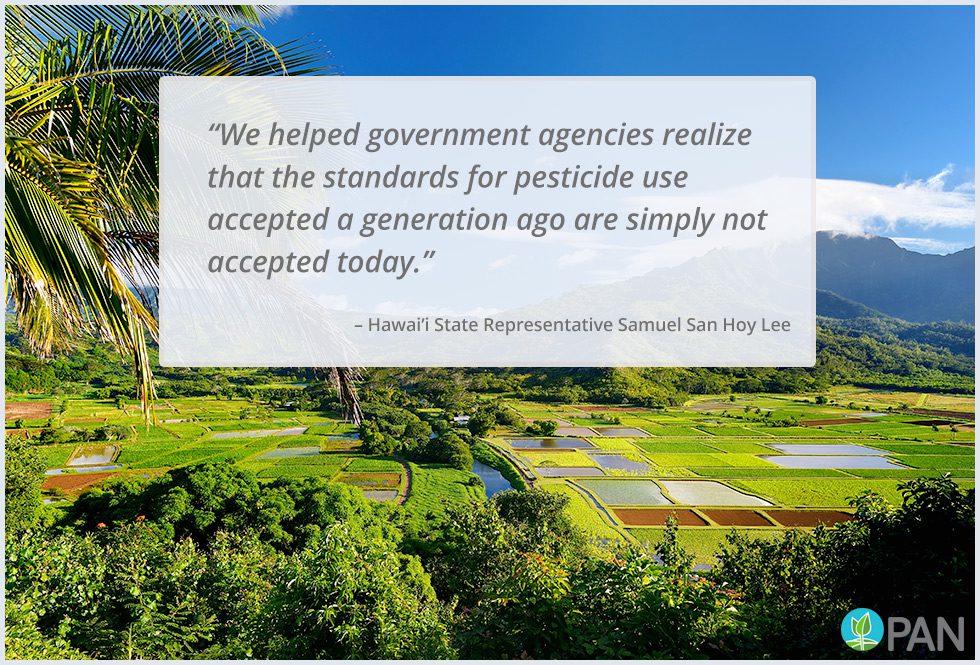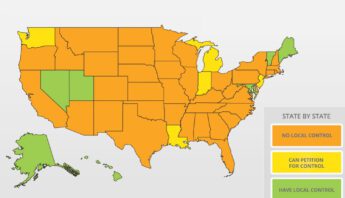From bee-friendly farming to protecting children from pesticide drift to GMO labeling, statehouses are stepping up for a healthier food system.<>
The people of Nebraska and Iowa have a different connection to farming than communities in California. That relationship is different again in upstate New York or on the Hawai’ian islands.
This reflects fundamental differences in the history and politics of agriculture in various parts of the country — plus basics like climate, soil and topography.
In many statehouses, a long tradition of leadership on farm policy is now zeroing in on pesticide-related issues, as public engagement in food and farming grows and federal rules remain weak.

Filling a leadership gap
While our food system is now undeniably a global one, in many ways food and farming are inherently regional — as are the problems and challenges associated with them.
State policymakers across the country are well positioned to find solutions that meet the needs of stakeholders and communities, and fill the gaps left by our inadequate national pesticide rules.
Taking advantage of this opportunity, however, requires political courage. Those benefiting from the current system — particularly the big pesticide corporations — are investing millions to protect the status quo.
Midwest states face drift & “superweeds”
Farming traditions run deep in the Midwest. Despite years of farm consolidation, rural communities still dot the landscape — and renewed attention to local food economies has energized a new generation of small-scale, sustainable farmers.
Yet as industrial production continues, the challenges associated with intensive chemical use grow increasingly urgent.
Widespread use of herbicides like atrazine and glyphosate in the corn belt, for example, have been linked to increased risk of health harms like birth defects and cancer — and create livelihood issues like “superweeds” and crop damage on neighboring farms.
Statehouses are taking note. In Iowa, for example, a farmer-led coalition is pressing state policymakers to develop new laws to protect farmers facing crop damage from drifting herbicides and improve drift reporting and regulation.
Protecting California communities
California’s strong specialty crop sector puts the Golden State at the top of the list for income from agriculture. But in communities near agricultural fields — especially near conventional strawberry farms — families and children can face harmful pesticide exposures.
A recent report from the state’s Department of Public Health, for example, showed that health-harming pesticides are sprayed within ¼ mile of more than a half million California schoolchildren.
Affected communities are now calling on the state to restrict or eliminate use of the most harmful pesticides near schools and other sensitive sites. In early 2015, California officials launched an effort to address this concern; communities are tracking the process carefully, pressing for protective policies for communities across the state.
States driving change
In states across the country, political leaders are stepping up to advocate for safer food and farming as their constituencies increasingly demand it.
California’s pesticide use reporting system — one of few in the country — has been a key driver of policy change for the state, and affected communities in other states are now demanding this basic right to know. For example:
- In Maryland, a committee of lawmakers and stakeholders is considering statewide use reporting;
- A use reporting system is on the policy agenda in Iowa’s statehouse; and
- Minnesota recently required “right to know” labeling for nursery plants treated with bee-harming pesticides.
The “right to know” call is also front and center when it comes to GMO labeling, with increased recognition that these crops are designed for — and drive up use of — health-harming pesticides. Maine, Connecticut and Vermont have passed GMO labeling laws, and similar measures lost by razor-thin margins in Oregon, Washington and California.
Access to pesticide use information is important. But in many cases, enough is already known about the harmful effects of these chemicals to take action. State policymakers can and must be on the leading edge of putting policies in place that protect communities and help farmers shift away from reliance on health-harming pesticides.







